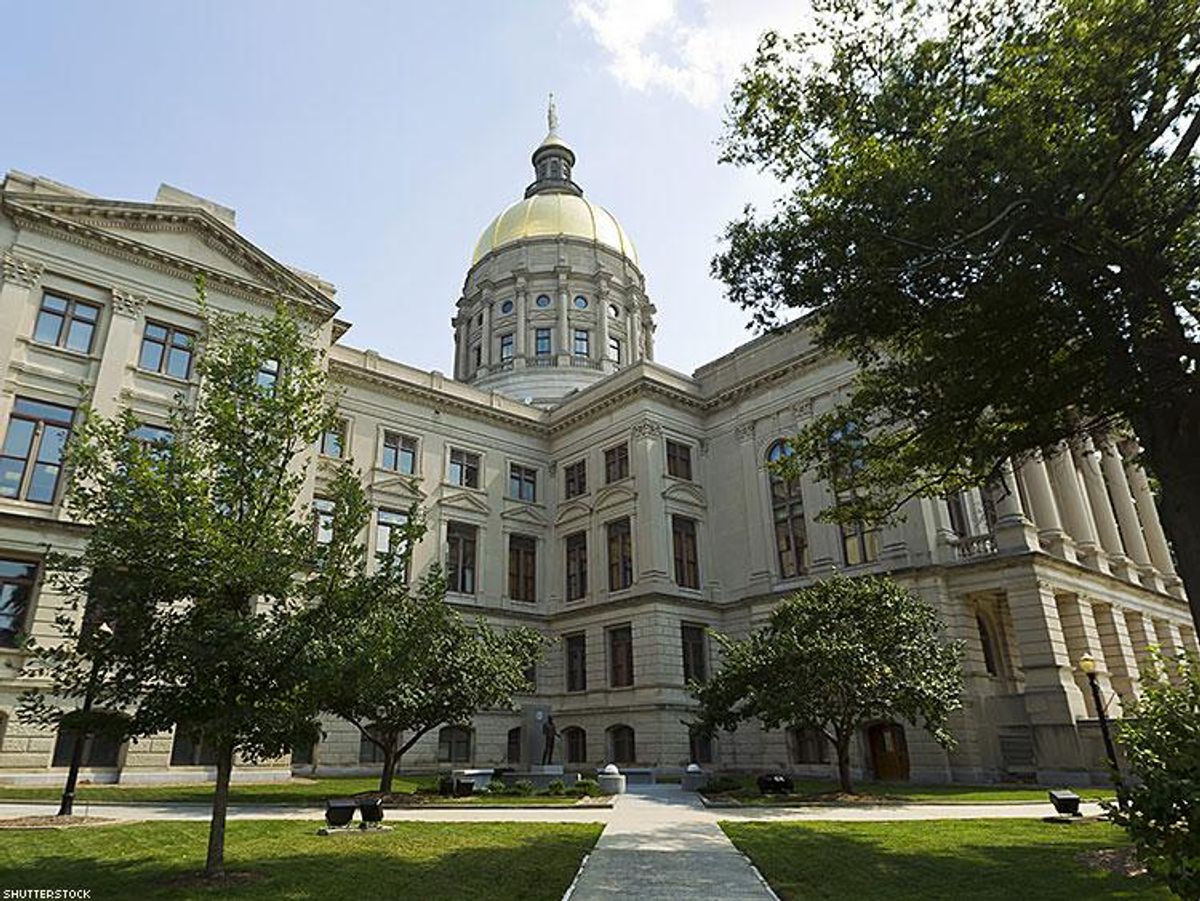A Georgia "license to discriminate" bill has been amended to make it even more antigay, and it is now headed to the governor's desk.
The Georgia House of Representatives today approved an amended version of House Bill 757, building on changes the Senate had made to the bill in February. The bill would allow businesses, nonprofits, and individuals to discriminate against LGBT people and others by citing religious grounds. The Senate approved the new version this evening, and it now goes to Republican Gov. Nathan Deal for his signature or veto, The Atlanta Journal-Constitution reports.
The bill started as the Pastor Protection Act, which would protect clergy members from being forced to perform weddings for same-sex couples -- but the First Amendment to the U.S. Constitution, guaranteeing freedom of religion, already enshrines clergy members' right to decide which couples they'll marry.
In February, the Senate combined this bill with the First Amendment Defense Act, which would prevent the state government from taking any punitive action against an individual or faith-based organization that speaks or behaves according to a sincerely held "religious or moral conviction" that marriage should only take place between two people of the opposite sex, or that sexual relations should be limited to such a marriage. Such faith-based organizations could include social service providers, such as adoption agencies, food pantries, or homeless shelters, which often receive public funding.
Today, the House added language from the federal Religious Freedom Restoration Act of 1993, which says government can interfere with a person's religious practice only if it proves a compelling interest. This law and state versions of it have generally been aimed at protecting private religious practices -- say, allowing the use of an otherwise illegal drug in religious ceremonies, or finding the least intrusive way for members of faiths that don't use electricity (such as the Amish) to meet vehicle safety requirements. But in recent years, such laws have been proposed as a means to allow individuals, and even for-profit businesses, to discriminate against customers or employees that offend their religious sensibilities -- especially same-sex couples seeking wedding-related goods or services.
The new provisions in the bill "go far beyond protecting the right to practice one's religion and could allow a business owner or employee to refuse service to LGBT people," says a press release from the Human Rights Campaign and Georgia Equality, which have called on Deal to veto it. They "could undermine local nondiscrimination ordinances that protect LGBT people, permit hospitals to refuse to provide medically necessary care, or allow a taxpayer-funded service provider to discriminate by denying a job because of the applicant's religion, sexual orientation, or gender identity," the release continues.
The bill does say it "cannot be used to allow 'discrimination on any grounds prohibited by federal or state law,'" the Journal-Constitution reports, but neither Georgia nor federal law explicitly prohibits anti-LGBT discrimination, even though some federal agencies have interpreted existing civil rights law to this effect.
Several major corporations that have headquarters or operations in Georgia have stated their opposition to the earlier version of the bill, including Coca-Cola, Dell, Hilton, IHG, Marriott, Microsoft, and Salesforce. Although he is a conservative Christian, Deal also expressed doubts about the earlier version of the bill, saying, "We do not have a belief in my way of looking at religion that says we have to discriminate against anybody."
"Governor Deal made clear weeks ago that he wouldn't sign legislation that allows discrimination -- now is the time for him to show Georgia and the nation that he means it," said a statement issued by HRC president Chad Griffin. "Shockingly, the decision by the legislature today was to make an egregious and discriminatory bill even worse. It's appalling that anti-equality extremists in the legislature are trying to ignore the will of the people of Georgia, and to empower businesses with the explicit right to discriminate and deny service to LGBT Americans. Corporate leaders in Georgia and across the country have already spoken out against this bill because the First Amendment already protects religious freedom. It's time for Governor Deal to veto H. 757. Anything other than a swift veto is only courting an Indiana-style backlash."












































































